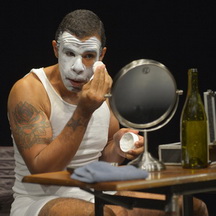In a Bottle, a Tube and a Small Packet
“Fidel only talks to Raúl, Hugo and me.” So claims Barbarita Perales, the inventor (and sole distributor) of Amor Cubano, the love potion in a bottle, a tube and a small packet. Maceo Cabrera Estevez, the inventor of Barbarita, brought her fiery but pragmatically entrepreneurial Cuban alter ego to La Peña this past weekend to perform a live infomercial on the virtues of Amor Cubano.
Sidling through the audience in a low-cut, form-fitting, sequin-bedecked orange dress, Barbarita greeted the audience with hugs and kisses before taking her seat on stage, her peacock chair surrounded by white and red rose petals, red satin swags decorating the corners of the stage.
After the revolution, Barbarita confides, as Cubans spread throughout the world to places such as the Soviet Union, Zaire and Angola, it was clear that Cubans were “the best lovers.” She wags her head knowingly. So … from 1964 to 1967 a scientific study examined the roots of this amorous brilliance, discovering a chemical in the Cuban coffee bean that amps up desire … and “nervios.”
With the collapse of the Soviet Union and the Cuban economy, life in Cuba became more arduous. When people began “using oranges for deodorant” Barbarita had her great idea: distill and market the chemical as Amor Cubano, in a bottle, a tube and a small packet.
True to her word, she calls up Castro—“Sweetheart!”—to urge him to join her in her product campaign for Amor Cubano. Which, after a bout of palpitations, he does, making a three-day-long speech and releasing his unmistakable portrait to Barbarita for her promotional T-shirt with the caption “Fidel Gone Wild.”
But that’s only the start, as a parade of happy customers—both in video clips and as impersonations by Estevez—endorse the product: there is the husband who can’t take Viagra because it makes him sick, the guy who stashes Amor Cubano in every cupboard including his car’s glove compartment, and the girl in the United States who, under the influence of Amor Cubano, designs a thong with beret-topped Che Guevara’s face on the triangle of fabric.
Getting serious
Television news coverage breaks through the endorsements. An anchorwoman relates mysterious developments in Iran: American soldiers are walking through the desert toward the gulf. Then, in one of Estevez’ more startling turnarounds, she appears as a young Hispanic soldier, who had joined the Army to see the world only to find that she was fighting against men, women and children who looked like her family. In an emotionally moving monologue she comes to the final conclusion that “there is no love in war.”
Estevez moves quickly back to Barbarita. Through her, Amor Cubano comes to the U.S. Army, inciting its soldiers to drop their weapons in the desert and embrace the Iraqi people. Not long after, the capitalist appears, imagining a worldwide chain of stores—Che Mart—where Amor Cubano, in a bottle, a tube and a small packet can be bought. Barbarita herself sets up a spa called “Buddha en Cuba,” where you can converse with the Dalai Lama and fingerpaint with Fidel.
Estevez has freshened political satire by merging American satire with a distinctly different cultural perspective, weaving together the absurdities of contemporary politics and mores, to reveal a fabric that is sly, silly, shocking and tender. Though the final message of her performance could be reduced to “make love not war,” how she arrives at that conclusion is complex, sophisticated and very entertaining.
—Jaime Robles
Originally published in the Piedmont Post
